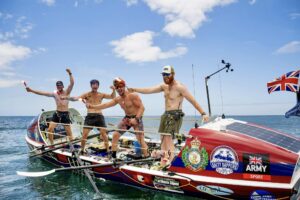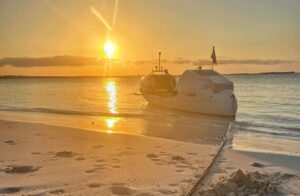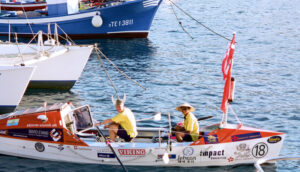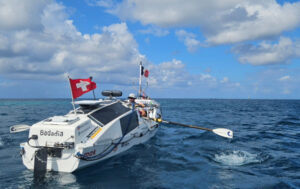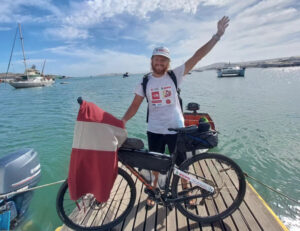Since our last ocean rowing roundup, a brand-new ocean rowing race has launched and Andrew Bedwell’s effort to sail the Atlantic in the world’s smallest yacht lasts less than a day.
Pacific Ocean
The Pacific Challenge has started. June 12 marked the beginning of the inaugural race run by Atlantic Campaigns, the same company that has been organizing the Talisker Whisky Atlantic Challenge since 2012.

The Pacific Challenge route. Photo: Worldstoughestrow.com
The event will see 14 crews, made up of 49 rowers, race 4,500km across the Pacific Ocean from Monterey, California to Hanalei, Hawaii. “As a relatively new and untouched route, the Pacific challenge offers new adventures, new world records, and once-in-a-lifetime experiences,” the Atlantic Campaigns website claims.
Only 82 people have successfully rowed from the Hawaiian islands to the USA. Far fewer than have crossed the Atlantic.
A number of the crews and rowers who have previously taken part in the TWAC were drawn in by the new challenge. Soloist Paul Lore told People: “The Pacific is significantly more challenging because of the multiple currents, the cold water, big waves, and fog that reduces visibility to zero at times.”
View this post on Instagram
The average crossing time is 62 days. The record is 30 days, five hours, and 37 minutes set by the Latitude 35 team in 2022 during the Great Pacific Race. That race is very similar to the Pacific Challenge, also taking a route from the USA to Hawaii. Whilst the Pacific Challenge will be an annual event, the GPR has run four times since its inception in 2014.
All 14 crews have set off and are working to get away from the coastline. You can track their progress here.
Tom Robinson has completed the second leg of his row from Lima, Peru to Australia. His first leg saw him row to Penrhyn, one of the Cook Islands, in 160 days. He waited there for four months to avoid the cyclone season and set out again on April 14.
After 38 days and 1500km at sea, the Australian arrived in Pago Pago, American Samoa on May 21. He was initially going to stop in Tau but decided to change course. Instead, he rowed to the larger, more densely populated Pago Pago as he thought it would be an easier place to restock and heal the injuries he sustained while rowing.
One of the hardest parts of the row was leaving Penrhyn. Robinson had felt at home there, “as I rowed away from Penrhyn that day…I realized that I had found what I had been looking for all this time. I’d been searching for something better than the big city, and here on Penrhyn, I had found it. To then be rowing away from this paradise seemed in that moment completely preposterous,” he wrote.

Tom Robinson’s journey so far. Image: Tomrobinsonboats.com
The row was not a comfortable one. Robinson was not sleeping or eating well and he never quite found the rhythm of his first leg. He first planned to land in Fiji, a row he expected to take 60 days, but his health took a turn for the worse. Sores broke out all over his legs, oozing puss. They didn’t heal and soon spread over the rest of his body. Worried that the sores would become infected he landed on Pago Pago, American Samoa.
Robinson must make it back to Australia before the next cyclone season in November. He plans to leave American Samoa in the next few days and head to Fiji.
Indian Ocean
Robert Barton is another Australian soloist currently rowing the world’s oceans. Starting in Carnarvon, Australia on April 25, he hopes to make it 8,358km to Tanzania.
Barton did not have an easy start to the journey. In the first few weeks, he suffered seasickness, a flooded cabin, capsized once, and his autopilot broke in ever-worsening weather.
Eventually, on May 18, Barton managed to eat three full meals for the first time on the trip. Since then, things have started to improve. The sea has been calmer and he has adjusted to solo life on the boat. Barton commented on social media that though he misses his family immensely and would love some fresh fruit, he is quite content with life on the rowing boat.
A big moment for Barton came on June 6, when he reached the halfway point of his row. He originally thought that the journey would take between 150 and 200 days, so was thrilled to find himself at the halfway mark on day 42. After seven weeks he said it feels as though he has been on the water for a week or two, and that the first few tough days seem like a distant memory.
Atlantic Ocean
Big C Atlantic Challenge was the most unusual project to take to the oceans since our last roundup. It is a sailing challenge that treads a thin line between innovative and insane. Andrew Bedwell wanted to sail 1,900km from Canada to Cornwall in the world’s smallest yacht.

Photo: Big C Atlantic Challenge
Bedwell is an experienced sailor, he has navigated around Britain, sailed to the Arctic Circle, and delivered yachts all over the world. But this is something very different, Bedwell has spent years making a tiny 3ft by 11ft yacht.

Photo: Big C Atlantic Challenge
Bedwell set sail on May 27, but after just a few hours at sea, the campaign ended in disaster. The vessel was taking on water and he had to turn back. By the time he got back to shore, the tiny yacht had taken on almost a tonne of water. As the boat was lifted from the water the framework gave way completely and the boat fell apart.
In a tearful video, Bedwell apologized to everyone who has followed his project. “I don’t know what to say to everyone who’s supported me, helped me. You’ve all been absolutely amazing. Big C is no more. She can’t carry on. I can’t do it, I’m sorry.”
He has now started work on a new design to attempt the crossing again.

